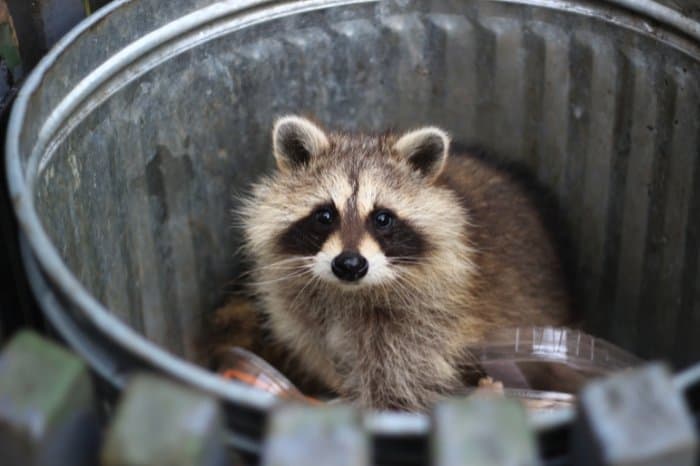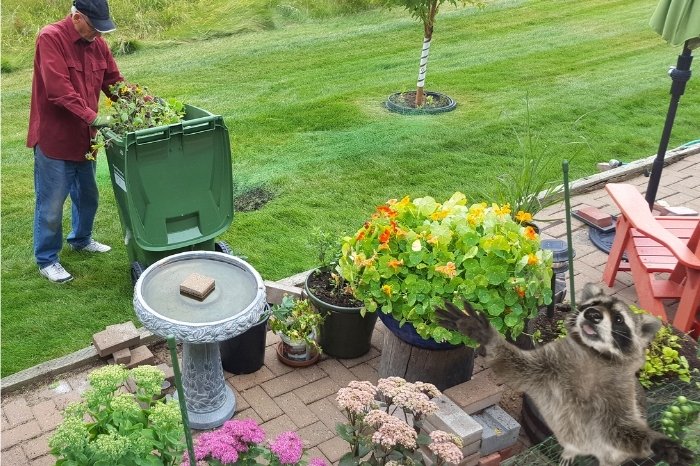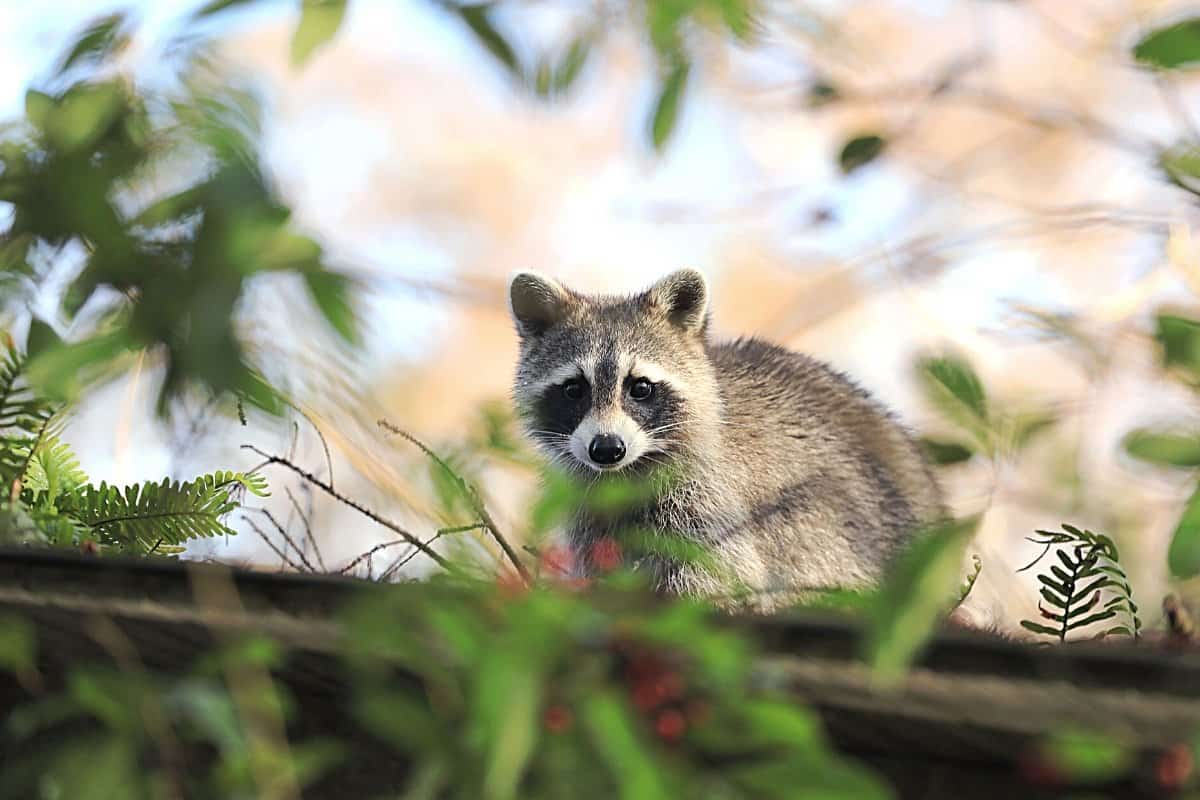Last Updated on January 18, 2023 by Urska
Raccoons are nocturnal animals increasing daily; that’s why many are looking for how to keep raccoons out of the garden easily.
Any unsecured trash bin is the first attraction to raccoons. They love to scavenge around homes and gardens where they can get remains of food to eat and leave a disaster behind.
They prefer living in areas with abundant trees and water, but still, you will find them roaming the streets at night due to the generosity of food, water, and shelter.
In addition to garbage cans, raccoons love sweet corn excessively. They are omnivorous and enjoy eating melons, strawberries, peas, potatoes, tree fruits, and grubs on your lawn. These animals are notorious for digging holes in maturing melons and munch on the ripening fruit to the disappointment of gardeners. They make holes in lawns and mulch piles, looking for grubs to eat. Similar to squirrels, they also clean out bird feeders.
In short, these animals are destructive, and no gardener wants them anywhere close.
Signs That Raccoons Are Visiting Your Garden Or Yard
Here are signs to look out for and know if you have raccoons in gardens or yards:
- Garbage cans fallen, opened and trash scattered all around
- Holes in your mulch and lawn
- Missing fish from a water fountain or garden
- Empty birdfeeders mangled and destroyed
- Half-eaten food produce, missing or half-eaten corn stalks
- Availability of tubular droppings on woodpiles, logs, or near the bottom of trees
Keeping Raccoons Out Of The Garden
Now that you know the signs of raccoons in your garden, it’s time we looked at ways of keeping them out of your lawn or garden.
If you are trying to keep raccoons out of the garden or lawn, you will notice they display a certain degree of persistence and ingenuity that is alarming.
Here are several ways you can use to keep them away, no matter their persistence.
Read more about:
Safeguard Your Trashcans
Raccoons are attracted to trash and can’t resist them no matter what. Therefore, you will need multiple strategies to curb them from your trashcans.
If your trashcan lids are not lockable, secure them with cinder blocks or bungee cords. Use heavy-duty trash bags that cannot tear easily.
Double bag your meaty waste to help reduce the odor in the trashcan. The more odor your trashcan produces, the more it attracts these scavengers.

Remove All Foods From Their Access
Gather all fallen fruits, don’t allow overripe fruits to continue sitting on the trees or the ground, remove all grown vegetables from the garden, etc.
If you toss food scraps in your trash bin, ensure it has a locking cover. Bring your bird feeders in at night. Generally, ensure any types of food they can access is kept away from these animals.
What About Pet Food?
Pet food should also be kept away from these animals. Raccoons love pet food of all kinds, so never leave it out overnight.
Seal every pet entry door at night to make it inaccessible to raccoons. Make sure your pets have all necessary shots given just in case they interact with a raccoon. Raccoons are known to carry rabies and distemper and could pass it on to your pets.
Clean Up
Like many destructive animals, raccoons love lawns and yards with places they can easily hide. Clear your lawn, remove brush, mow your grass and prune overgrown shrubs.
Destroy all hiding places by sealing any available spaces around the bases of decks and sheds using chicken wire or hardware cloth. Seal all entry points in chimneys, attics, and eaves to keep raccoons out completely.

ScareAnd Scuttle Them
After securing your trashcans and cleaning up. If these animals still show up, get ready to scare their hearts out of them. Use radios or other noisemakers that can deter them.
Get motion-detecting sprinklers or strobe lights. These methods and more will scuttle them in most cases, never to return. Please don’t stick to one method; use several methods alternatively, so they don’t become accustomed to one method.
Use Repellants To Deter Them
You can also use raccoon’s repellants to deter these animals. Though these repellents tend to have mixed results because this animal is so persistent, they are worth a try.
Cayenne does not hurt birds. However, some gardeners report success with deterring raccoons on corn by growing prickly squash or pumpkin vines around it. You can also lace birdseed with cayenne to deter these animals.
Fence Your Garden
If all else fails, fence your garden. Remember that raccoons are good climbers, too, so make your fence electrified.
Use a 2-wire electric fence, placing wires at 6 and 12-inches above the ground. Set the fence on a timer to run only after dark when these animals are planning their raid.
Amagabeli 48×50 Hardware Cloth 1/2 Inch 19 Gauge Square Galvanized
Conclusion
One of the most effective ways to deter raccoons is not to give them a reason to visit your home. Raccoons are always out hunting for food to eat, and keeping them away starts with taking away the food.
Lots of hard work and time goes into gardening. The last thing you want is for all of that time and hard work to be destroyed by a hungry raccoon. If you plan, you can easily know how to deal with raccoons in your garden.
Whether you choose to deter, repel, or call in assistance, knowledge on how to eliminate raccoons goes a long way. The best policy is to make your garden completely inaccessible to destructive animals, as this will protect your produce.
Focus on the following strategies that aim to scuttle away raccoons and make your home and garden unwelcoming to raccoons in the first place.
Whatever tactic you choose, remember to be patient and diligent. Raccoons are clever, persistent, and if you are not paying close attention, they will take advantage of your laxity.
Moreover, that could cost you losing your delicious veggies that you have spent all summer growing and tending. You will want these vegetables and fruits on your plate, not on a raccoon’s tummy!
FAQs
What scents keep raccoons away?
They don't need to smell anything to know that you have food. Although I have read that raccoons have a very good sense of smell. I have heard that You can use cinnamon, peppermint, cedar, and orange oil.
The best deterrents are actually visual: large eyes and a big snout. They're more likely to run from something they can see than something they can smell.
What is a natural deterrent to raccoons?
The best thing you can do is to put out food that is not attractive to them. I think if you want to be 100% sure they won't come, then you have to make it not worth their time. The easiest way to do this is to put out food that they will never want to check out.
Raccoons can be deterred with some type of deterrent, such as: spray bottle filled with vinegar or other alcohol (don't use the alcohol to drink).
Why are they coming around?
If you see one in your yard, it's because they're looking for food and shelter.
Raccoons are not generally aggressive toward humans. They have excellent sense of smell and will quickly leave when they sense danger. However, if you are attacked by a raccoon, take cover and get away from the animal. Do not try to grab the animal; it may bite.
Raccoons are not afraid of dogs or cats.
How do you get rid of a raccoon?
A raccoon trap is a good idea. You can buy them on Amazon or at your local hardware store. They're basically a box with an entrance hole in one side, and a trap door on the other side. The raccoon sticks its head into the trap, the door closes, and the trap door drops down on it.
Do not use repellent sprays or poisons as these can harm the animals and their young. If you find a live raccoon, call your local wildlife agency and report the situation.
How do I keep racoons out of my garden?
The raccoon is the most common nocturnal rodent in North America. The raccoon has the largest brain of any mammal.
Raccoons are omnivorous and will eat almost anything they can get their hands on. You can try to discourage them by keeping all the fruit trees in your yard pruned so that there is nothing to tempt them into eating. Also, make sure you don't have any bird feeders. If you see a raccoon in your yard, just ignore it. They'll move on eventually.
Caroline is a gardener who loves to get down to the nitty–gritty of gardening. She proudly proclaims herself as a ‘dirt worshipper‘ and can often be found deep in the garden, covered in soil and singing to her plants. As a self–proclaimed ‘plant whisperer‘, Caroline believes that plants need love and attention just like any other living thing, and she loves to give them both. When she‘s not tending to her garden, you can often find her researching the latest gardening trends, or teaching others how to make their gardens thrive


